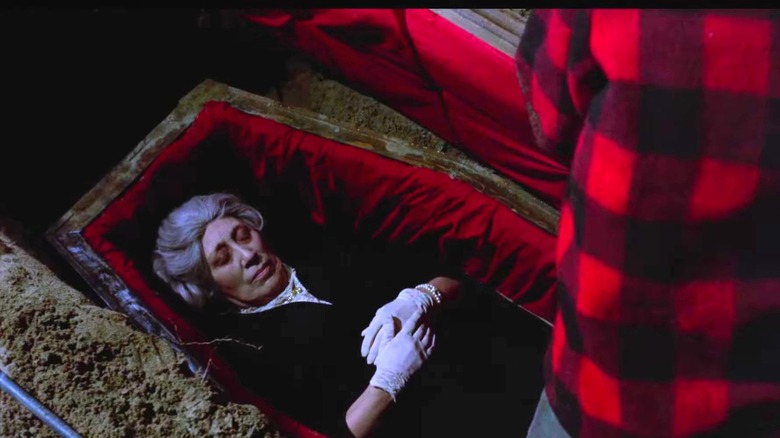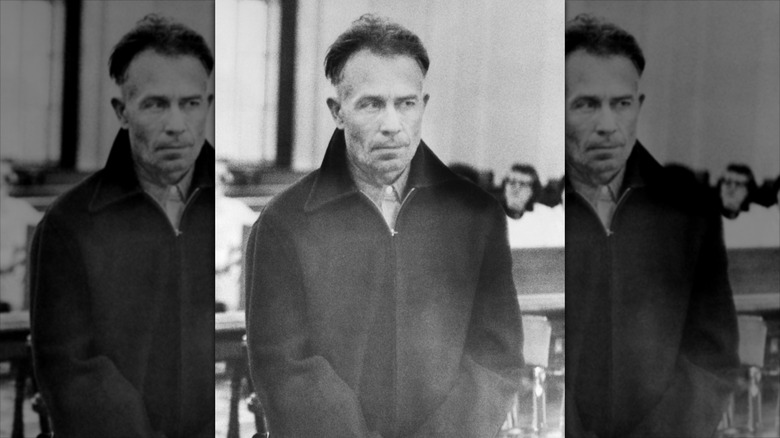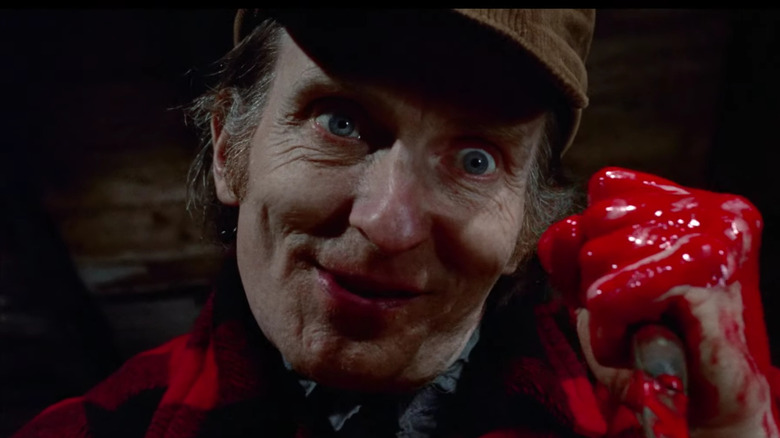This Once-Disappeared '70s Horror Movie Influenced One Of Netflix's Biggest Hits Today
We may receive a commission on purchases made from links.
Ed Gein's life and crimes have inspired filmmakers since shortly after his arrest. From the 1960 Hitchcock classic "Psycho" (and its nerve-shredding effects on anyone taking a shower in a motel) to the buzzy Season 3 of Netflix's "Monster," starring the inaccurately handsome Charlie Hunnam as Ed Gein, writers and directors have been captivated by the strange and sinister world of Ed Gein and the house of horrors he built for himself.
One of the weirdest entries in the Ed Gein legacy roll call is the 1974 B-movie "Deranged," a comedy-horror-tragedy-gross-out mishmash billed with the tagline "Pretty Sally Mae died a very unnatural death ... but the worst hasn't happened to her yet!" Christopher Walken and Harvey Keitel both tried out for the role of Gein stand-in Ezra Cobb, but the role went to previously-unknown Roberts Blossom, who, despite that name, and a truly eerie performance as a pseudo-Gein, never really made it big on the screen.
Mired in post-production lawsuits and cursed with mixed-to-bad reviews (the LA Times critic called it "corn on the macabre"), "Deranged" was feared lost until it resurfaced in the mid-1990s. Now reissued in a number of formats, this masterwork of the grim and gory will be unnerving audiences for decades to come.
Ed Gein was a real (and real creepy) dude
"Deranged" bills itself as "absolutely true," per AFI Catalog, and while that's a bit of an exaggeration, it does model itself closely on the "career" of murderer and general creepazoid Ed Gein, the most upsetting Wisconsinite in the generation before Jeffrey Dahmer. With only two confirmed victims, Gein is right on the cusp of being by definition a serial killer, since his confirmed body count of just two people murdered falls short of some definitions (though some people suspect him in the death of his brother), but his grave-robbing, necrophilia, and suspected cannibalism give him notoriety far beyond his thankfully low body count.
The victim of intense child abuse from his adored mother, Augusta, Gein cracked after her death. He preserved Augusta's part of the house, filling the rest with corpses he disinterred from the local cemetery and dissected. He used human remains to upholster a chair, make a bowl, and create a "female suit" he apparently wore (this is where the "Silence of the Lambs" guy got the idea), leaving spare parts around the house like the demented crafter he was. And the two women he killed, tavern keeper Mary Hogan and hardware store owner Bernice Worden, were both large-bodied, assertive women who were noted as being of a type with the late Augusta.
Fifteen women's bodies, in whole or in part, were found in Gein's house. Gein denied having intercourse with the remains or eating any parts of them, though he did use them for "sexual gratification" per Ebsco; whether he's credible is up to you.
Deranged replicates Gein's creepy crimes
"Deranged" isn't a documentary, despite the "journalist" who pops up as a pseudo-narrator from time to time, but it certainly captures the feel of the Gein story. It was bankrolled by a concert promoter who had been obsessed with the Gein tale since he was a child, so while it's unnerving to call something like this film a labor of love, on some level that's exactly what it is.
The set dresser read articles about Gein to inspire his work, which is why much of the film takes place in a dirty house full of human remains and dirty magazines. The movie's Canadian filming location captures the bleak winters Gein spent as a recluse with the dead for company in that Wisconsin farmhouse. The crew also restrained themselves from juicing Gein's kill count to make a more eventful film, only adding one more death, and instead focusing on how very, very morbid that house was.
The film does pretty up Gein's murder victims, casting attractive actresses younger than the matronly, middle-aged women on whom Gein preyed. It also portrays him as unearthing the body of his mother Augusta to keep her with him "Psycho"-style, chronicling her decay as the film goes on; despite his obsession with Dear Mother, the real-life Gein left her where she lay.
Deranged was once lost, but came back to light in the 1990s
After "Deranged" was released in 1974, it slipped into obscurity, remembered only by connoisseurs of the weird and "perverts, voyeurs, and potential psychopaths" identified by an LA Times movie critic as the film's target audience. After struggles to work with a major distributor due to the subject matter and some nasty post-release litigation, "Deranged" was considered lost for about 20 years, though other sources indicate that it was somewhat available, just in low-quality and heavily censored versions.
A "pristine" copy of "Deranged" was discovered under unclear circumstances sometime in the mid-1990s. To the delight of niche fans, this version preserved the footage snipped to get the film an R rating, so the whole bloody affair could now be shown again. This time around, horror fans weren't going to let this nasty little nugget slip back through the cracks, and "Deranged" is now widely available in a variety of formats.


